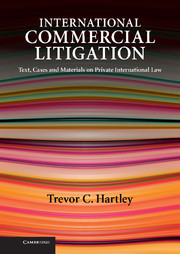Book contents
- Frontmatter
- Contents
- Table of panels
- List of figures
- Preface
- Acknowledgments
- Terminology
- Table of Latin phrases
- List of abbreviations
- Table of cases
- Table of cases (European Court of Justice, numerical order)
- Table of legislative instruments
- PART I STARTING OFF
- PART II JURISDICTION
- 2 Jurisdiction: an analysis
- 3 Jurisdiction under EC law
- 4 EC law: special jurisdiction
- 5 The traditional English rules
- 6 Developments in Canada
- 7 US law: an outline
- 8 Choice-of-court agreements
- 9 Forum non conveniens and antisuit injunctions
- 10 Overlapping jurisdiction in EC law
- 11 Special topics – I
- 12 Special topics – II
- PART III FOREIGN JUDGMENTS
- PART IV PROCEDURE
- PART V CHOICE OF LAW
- PART VI EXTRATERRITORIALITY
- Bibliography
- Index
12 - Special topics – II
from PART II - JURISDICTION
- Frontmatter
- Contents
- Table of panels
- List of figures
- Preface
- Acknowledgments
- Terminology
- Table of Latin phrases
- List of abbreviations
- Table of cases
- Table of cases (European Court of Justice, numerical order)
- Table of legislative instruments
- PART I STARTING OFF
- PART II JURISDICTION
- 2 Jurisdiction: an analysis
- 3 Jurisdiction under EC law
- 4 EC law: special jurisdiction
- 5 The traditional English rules
- 6 Developments in Canada
- 7 US law: an outline
- 8 Choice-of-court agreements
- 9 Forum non conveniens and antisuit injunctions
- 10 Overlapping jurisdiction in EC law
- 11 Special topics – I
- 12 Special topics – II
- PART III FOREIGN JUDGMENTS
- PART IV PROCEDURE
- PART V CHOICE OF LAW
- PART VI EXTRATERRITORIALITY
- Bibliography
- Index
Summary
In this chapter, we consider two more topics.
Intellectual property
Intellectual-property rights are a key element in modern business. They come in a variety of forms. Some – such as patents, copyright and trade marks – are well established; others are of recent origin. Depending on the legal system involved, they may have to be registered in order to be valid – this is true, for example, in the case of patents – or they may not have to be registered – this is usually the case with copyright.
The essence of an intellectual-property right is that it grants a monopoly: the holder can do something that others may not do. If another person infringes that monopoly, the holder of the right may sue the infringer in tort. In such an action, the defendant can normally defend himself in two ways: he can claim that what he is doing does not constitute an infringement (because it is outside the scope of the monopoly); or he can argue that the intellectual-property right is invalid.
There are various ways in which the latter option may be pursued. The validity of the intellectual-property right may be raised as a defence in the infringement action, in which case it will have to be decided before judgment can be given. In some legal systems, the court hearing the infringement action may decide it as a preliminary issue; in others, it may have to be decided in separate proceedings – in the case of a patent, for example, proceedings may have to be brought before the national patent office.
- Type
- Chapter
- Information
- International Commercial LitigationText, Cases and Materials on Private International Law, pp. 288 - 316Publisher: Cambridge University PressPrint publication year: 2009



